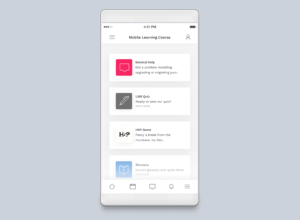There’s been a lot of excitement recently surrounding “next-gen learning” and Microsoft Teams. I know of a few organisations who are making the switch from Moodle to Teams, so I’m on a mission to find out how a communications platform built around chat, meetings and storage has slowly become recognised as a Learning Platform. And whether or not Moodle should be worried.

From my experience, Teams seems to fit well with organisations who have already adopted Microsoft into their ecosystem as opposed to say Google. Many organisations running their email, cloud storage, intranets (SharePoint) and office docs via Microsoft naturally see Teams as another weapon in the arsenal. It often has the buy-in from internal company stakeholders such as the IT team, senior leaders and just about everyone else in the organisation, and it’s cheap, sometimes free.
So what exactly is Microsoft Teams?
According to their website, Teams allows users to create and make decisions by “bringing everything together in a shared workspace where you can chat, meet, share files, and work with business apps“. So it’s a bit like Facebook Workplace then, and certainly nothing like an LMS, so why is it being used as one? Keep reading to find out.
Microsoft Teams is billed as a “Digital Hub that teachers and school leaders have been waiting for. Where teachers and students can experience a personalised, vibrant learning environment, as well as having many of the classroom basics, like assessments, assignments and notebooks“.
Now to most of us, this is just marketing speak. But when you are evaluating your LMS or considering a new one, then this marketing drivel is music to your ears. And Microsoft is a well established and widely known tech giant, and they’re cool, right? Well, er… no. But we’ll come onto that.
Organisations love the way that Teams integrate everything, so switching between a chat, video conference or document sharing is all done in a few clicks, all from within the same platform. Teams has changed the way organisations run a business, but I still fail to see how this can transform online teaching and learning. Where are the custom grading options and plagiarism tools? How can you use a quiz engine that only supports the most basic of question types? How do you structure a course and monitor completion tracking, course start dates and end of year rollovers?
Where are the learning plans, competencies and open badges? Where are the marking workflows, outcomes and rubrics? How can you create enhanced learning interactions from a word doc? It seems to me that most of the course content is derived from cloud services like OneDrive, favouring the creation of office documents to build up a course page as opposed to say lessons, databases, wikis and glossaries. But does the modern organisation actually need any of this old Moodle stuff? Is it still relevant?
In Teams, courses don’t exist in the traditional sense, instead, Teams uses workspaces. It is possible to add “tabs” to a workspace and link to or embed content from a popular cloud-based application, such as Trello, Asana, YouTube, Power BI or SmartSheet. At first, this sounds exciting, until you realise that we haven’t built an LMS, we have built an intranet. Tabs are like topics in Moodle. In each tab (page) you can include links, documents, embeds and tap into the other tools offered by the Microsoft suite.
So, in response to my early question, how does Teams become an LMS? Simple. Organisations are changing their needs and requirements for online learning. Perhaps they don’t need all the “teaching and learning tools” provided by Moodle. Perhaps they were never using them in the first place. Let’s be honest, how many corporate Moodle users use advanced grading, or set up the Workshop activity? How many organisations have gone beyond SCORM, a forum and a certificate? So maybe setting up a course like a modern intranet page is the way forward for them.
If this is the case, and we are no longer building courses in the traditional way, and it’s all now about document collaboration and cloud storage, meetings, chat, video and email then Moodle does feel out of place. But only in the way it’s marketed, positioned and perceived.
Moodle can do all of the above and more, if it’s configured to. Moodle has 365 integration, single sign-on, powerful forums, chat tools and social tools. And with a slick “Microsoft-style” theme, it could be made to look and feel every bit as “cool” as it’s Redmond rival. Unfortunately, Moodle isn’t seen as cool (I’m not sure Microsoft is or ever was, especially if you remember using Windows ME, and Bill Gates on-stage dance at the launch of Windows 95). However, a switch to Microsoft from Moodle can be seen as cool, innovative and “next-gen”. Organisations could be seen as trailblazers and trendsetters, going against the grain and challenging the very essence of the LMS.
Of course, if you are an institution who has used Moodle for a lot of years, then anything new and shiny will quickly become adopted. Out with old and in with the new does create a buzz, and the whole internal L&D culture can be changed overnight. “This is how we are going to build courses from now on” is the tune played by the senior leaders. A move that would be difficult to deploy if still using Moodle. “This is the way we’ve always done it”, would be the call back from disgruntled Moodle users when forced to make Moodle work like Teams.
So, should Moodle be worried about Teams? Well, the answer is yes and no. Moodle has released “Moodle Workplace”, which rivals Totara and other established corporate LMS platforms. But Moodle Workplace, nor Totara is not a direct competitor to Teams, it’s a different product. Microsoft Teams is like Facebook Workplace, I feel that these two platforms are competitors.
Essentially, it’s all down to the culture of the organisation. If an organisation can change the way they teach by using chat, video, office docs and collaboration then they will, and social business platforms will flourish. This culture change is a threat to Moodle, and to Totara and other LMS platforms (although Totara does offer Totora Social).
If an organisation still feels the true value of online teaching relies on the very foundations of what Moodle provides, in terms of pedagogy, teaching tools, course formats and reports then Moodle need not be worried.
If it were me, I’d be pitching to both camps and making sure that Moodle can respond to the culture change that is happening in L&D, the tools are there, it’s just nobody is positioning them to this new uprising. It’s all about positioning and “educating” new and existing Moodlers that there is plenty of life left in the LMS, and with Moodle you can get the best of both worlds. I’m calling it, Moodle Teams.


